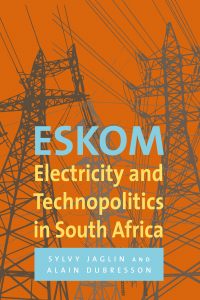Sylvy Jaglin and Alain Dubresson
ESKOM. Electricity and Technopolitics in South Africa
UCT Press, 2016, 196 p.
Traduction en anglais du livre : ESKOM. Electricité et pouvoir en Afrique du Sud, Karthala, Paris, 228 p.

Africa’s leading producer of electricity, Eskom Holdings SOC Ltd, is also a vertically integrated monopoly owned by the South African state. Eskom was shaken in 2008, when it was obliged to introduce ‘load shedding’, or rolling blackouts, and again in late 2014 . Since then, there has been an accumulation of grid dysfunctions, scheduled blackouts and blackout warnings.
Trying to understand how and why one of the pillars of South African state capitalism is now in distress, the authors of this book argue that the so-called electricity crisis is in fact a public monopoly crisis. Moving beyond technical aspects, they explore the relationship between state power and Eskom before, during and after apartheid. From this perspective, they suggest that the public utility’s current technical and financial troubles are illustrative of the weakening of its technopolitical regime, of how national institutions have governed Eskom’s technological development, and of the pursuit of political goals in the production of electrical power. Without a clear industrial strategy during the 2000s, Eskom became a powerful tool of Broad-Based Black Economic Empowerment, as well as a neopatrimonial system that generates profits captured by the ruling party’s elite. As a result, the crisis in Eskom shakes the whole political edifice.
Inefficient, and with its finances increasingly under scrutiny, the existence of this state-owned enterprise as a monopolistic public utility is regularly the subject of debate. The authors propose that the solutions for dealing with the crisis all point in the direction of de-integrating Eskom and allowing its current technopolitical regime to enter a planned or natural decline.





